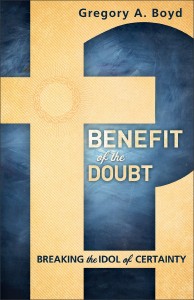Benefit of the Doubt
 I just finished reading Greg Boyd’s latest book Benefit of the Doubt. Like his others, this one does not disappoint. I so appreciate Greg’s honesty in approaching faith and humbly looking for truth, despite the often uncomfortable areas where it takes us.
As you might imagine, Greg does a great job challenging the supposed value of certainty in our faith (much like Daniel Taylor’s latest book that I recently reviewed).
I just finished reading Greg Boyd’s latest book Benefit of the Doubt. Like his others, this one does not disappoint. I so appreciate Greg’s honesty in approaching faith and humbly looking for truth, despite the often uncomfortable areas where it takes us.
As you might imagine, Greg does a great job challenging the supposed value of certainty in our faith (much like Daniel Taylor’s latest book that I recently reviewed).
But I’ve always wondered, why would God place a premium on one’s ability to convince oneself that something is true? What is particularly virtuous about one’s ability to push doubt aside and make oneself feel certain? It’s much easier to remain certain of your beliefs when you are not in personal contact with people who believe differently. The truth is that there simply is no way for a person to be concerned that what they believe is true if they’re at the same time trying to feel certain that what they already believe is true. The goal of believing the truth and the goal of feeling certain you already believe the truth are mutually exclusive. There is nothing virtuous about the ability to make yourself feel certain of things. The more rational a person is, the less they have this ability. The more simple or gullible they are, the better they’ll be.One of the areas of explanation that I found to be especially helpful was his comparison of faith as a covenant versus a contract. As he defined the terms, it quickly becomes apparent how much of American Christianity today falls under the contract model. I’m also confident that if we could teach people to follow God in the lens of a covenant we would see the Church become something dramatically stronger.
The most basic difference is that a contract is a legal arrangement made between people, while a covenant is a pledge of trust that involves the people themselves. In fact, covenants are not only different from contracts; in some respects they’re opposites. People enter into covenants because they trust one another; people enter into legally binding contracts precisely because they don’t. God pledges to faithfully demonstrate toward us the kind of character he displays on the cross.Around chapter nine the book really kicks it into overdrive. Greg argues something that sounds shocking at first until you continue to stew on it and realize that it is a fundamentally healthy way to process the Bible. He explains that all of Scripture must be read and understood through the lens of the cross. This notion also saves us from much of the bad theology we come up with as a result of taking verses out of context. This chapter alone is worth the price of the book!
We shouldn’t place the revelation of God in Jesus alongside the portraits of God in the Old Testament. Rather, we’ll only begin to see how Jesus reframes the story line of God’s dealings with Israel if we place his revelation over all previous revelations, and if we then interpret all previous revelations through the lens of this one. While everything in Scripture is inspired, not everything in Scripture carries equal weight. We cannot read the Bible as we would a cookbook, giving equal weight to everything it teaches. We should rather read it like a novel in which the final chapter forces us to rethink everything that preceded it. More specifically, they suggest that we should read the Old Testament through the lens of the revelation of God in Christ, and especially through the lens of the cross, which sums up everything Jesus was about.Another great aspect of this book is that he quotes from a variety of other sources. Here are some of my favorite quotes from other people:
Doubt is a pain too lonely to know that faith is his twin brother. —KHALIL GIBRAN Doubt is not a pleasant condition, but certainty is absurd. —VOLTAIRE You have made us for yourself, and our hearts are restless till they find their rest in you. —ST. AUGUSTINE You only truly believe that which moves you to action. —DOUGLAS CHENEY When I read Scripture, I know only Christ Crucified. —MARTIN LUTHER Half the promises people say were never kept, were never made. —EDGAR WATSON HOWEAnd since I’ve learned that whenever I mention Greg Boyd there are a handful of people who will hit their heresy buttons and fire up their digital courage to blast the both of us, consider an important insight that Greg points out: “I think it’s worth noting that no one in the New Testament ever claimed to know that another human was damned.” Well said. If thoughtfully challenging our questions and seeking to follow Jesus in the midst of them is heresy, we could sure use some more heretics.
Do You Want to Read the Bible Without Falling Behind?
Sign up your email and I’ll send you a PDF to download and use my custom-made reading plan system. There’s no way to fall behind on this system and every day will be different no matter how long you use it!
I’ll send future content directly to your inbox AND you can dive into the Bible like never before.




